theartofpublicspeakingchapter
The Art of Public Speaking Chapter2
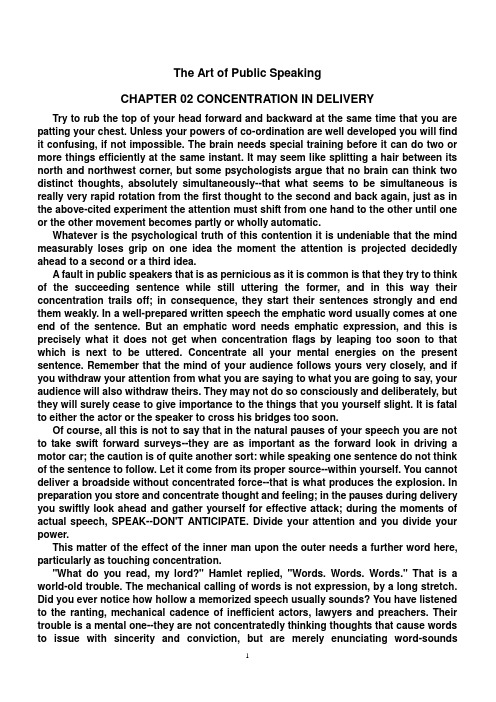
The Art of Public SpeakingCHAPTER 02 CONCENTRATION IN DELIVERY Try to rub the top of your head forward and backward at the same time that you are patting your chest. Unless your powers of co-ordination are well developed you will find it confusing, if not impossible. The brain needs special training before it can do two or more things efficiently at the same instant. It may seem like splitting a hair between its north and northwest corner, but some psychologists argue that no brain can think two distinct thoughts, absolutely simultaneously--that what seems to be simultaneous is really very rapid rotation from the first thought to the second and back again, just as in the above-cited experiment the attention must shift from one hand to the other until one or the other movement becomes partly or wholly automatic.Whatever is the psychological truth of this contention it is undeniable that the mind measurably loses grip on one idea the moment the attention is projected decidedly ahead to a second or a third idea.A fault in public speakers that is as pernicious as it is common is that they try to think of the succeeding sentence while still uttering the former, and in this way their concentration trails off; in consequence, they start their sentences strongly and end them weakly. In a well-prepared written speech the emphatic word usually comes at one end of the sentence. But an emphatic word needs emphatic expression, and this is precisely what it does not get when concentration flags by leaping too soon to that which is next to be uttered. Concentrate all your mental energies on the present sentence. Remember that the mind of your audience follows yours very closely, and if you withdraw your attention from what you are saying to what you are going to say, your audience will also withdraw theirs. They may not do so consciously and deliberately, but they will surely cease to give importance to the things that you yourself slight. It is fatal to either the actor or the speaker to cross his bridges too soon.Of course, all this is not to say that in the natural pauses of your speech you are not to take swift forward surveys--they are as important as the forward look in driving a motor car; the caution is of quite another sort: while speaking one sentence do not think of the sentence to follow. Let it come from its proper source--within yourself. You cannot deliver a broadside without concentrated force--that is what produces the explosion. In preparation you store and concentrate thought and feeling; in the pauses during delivery you swiftly look ahead and gather yourself for effective attack; during the moments of actual speech, SPEAK--DON'T ANTICIPATE. Divide your attention and you divide your power.This matter of the effect of the inner man upon the outer needs a further word here, particularly as touching concentration."What do you read, my lord?" Hamlet replied, "Words. Words. Words." That is a world-old trouble. The mechanical calling of words is not expression, by a long stretch. Did you ever notice how hollow a memorized speech usually sounds? You have listened to the ranting, mechanical cadence of inefficient actors, lawyers and preachers. Their trouble is a mental one--they are not concentratedly thinking thoughts that cause words to issue with sincerity and conviction, but are merely enunciating word-soundsmechanically. Painful experience alike to audience and to speaker! A parrot is equally eloquent. Again let Shakespeare instruct us, this tune in the insincere prayer of the King, Hamlet's uncle. He laments thus pointedly:My words fly up, my thoughts remain below: Words without thoughts never to heaven go.The truth is, that as a speaker your words must be born again every time they are spoken, then they will not suffer in their utterance, even though perforce committed to memory and repeated. Such speeches lose nothing by repetition for the perfectly patent reason that they arise from concentrated thought and feeling and not a mere necessity for saying something--which usually means anything, and that, in turn, is tantamount to nothing. If the thought beneath your words is warm, fresh, spontaneous, a part of your self, your utterance will have breath and life. Words are only a result. Do not try to get the result without stimulating the cause.Do you ask how to concentrate? Think of the word itself, and of its philological brother, concentric. Think of how a lens gathers and concenters the rays of light within a given circle. It centers them by a process of withdrawal. It may seem like a harsh saying, but the man who cannot concentrate is either weak of will, a nervous wreck, or has never learned what will-power is good for.You must concentrate by resolutely withdrawing your attention from everything else. If you concentrate your thought on a pain which may be afflicting you, that pain will grow more intense. "Count your blessings" and they will multiply. Center your thought on your strokes and your tennis play will gradually improve. To concentrate is simply to attend to one thing, and attend to nothing else. If you find that you cannot do that, there is something wrong--attend to that first. Remove the cause and the symptom will disappear. Cultivate your will by willing and then doing, at all costs. Concentrate--and you will win.。
The art of public speaking chapter
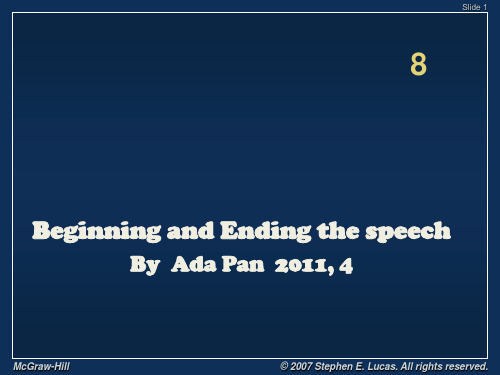
Slide 17
Signal the end of the speech
–Verbal Cues
• “In Conclusion” • “One Last Thought”
–Manner Of Delivery
• Crescendo Ending • Dissolve Ending
McGraw-Hill
McGraw-Hill
© 2007 Stephen E. Lucas. All rights reserved.
Slide 9
Tips for Preparing the Introduction
2. Keep An Eye Out For Possible Introduction Material As You Do The Research
–File Them With Your Notes To Keep Them Handy
McGraw-Hill
© 2007 Stephen E. Lucas. All rights reserved.
Slide 10
Tips for Preparing the Introduction
3. Be Creative In Devising The Introduction
–Ends The Speech On A Strong Note
• Gives The Speaker One Last Chance To Emphasize The Main Points
• Creates A Favorable Final Impression
McGraw-Hill
© 2007 Stephen E. Lucas. All rights reser1v6ed.
The-art-of-public-speaking-chapter-1-.2-.3

•Not only do words change from language to language, but so do ways of thinking and of seeing the world.
tic expression (song, poetry, play) persuasion advising inspiring argumentation
McGraw-Hill
© 2007 Stephen E. Lucas. All rights reserved.
Slide 7
PS & intercultural communicative competence
Slide 9
Cultural Diversity and Public Speaking
Diversity and multiculturalism are such basic facts of life that can play a role in almost any speech you give:
2. If there is a language difference between you and your audience, avoid any words or phrases that might cause misunderstanding.
3. When delivering your speech, be alert to feedback that might indicate the audience is having trouble grasping your ideas.
The Art of Public Speaking Chapter3——New Words & Questions Part1
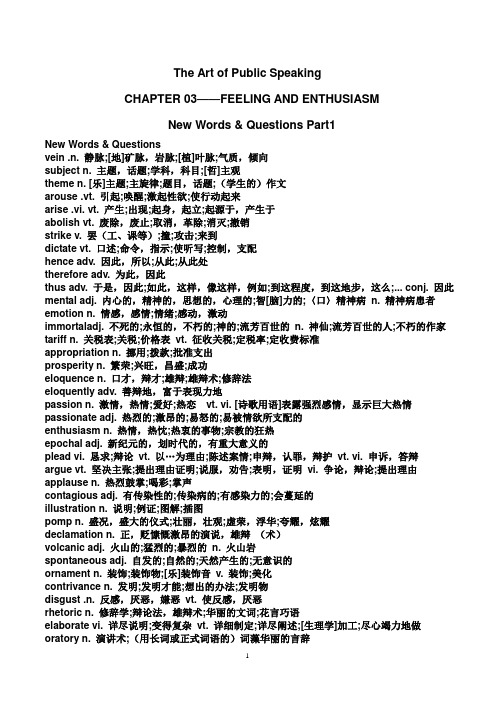
The Art of Public SpeakingCHAPTER 03——FEELING AND ENTHUSIASMNew Words & Questions Part1New Words & Questionsvein .n. 静脉;[地]矿脉,岩脉;[植]叶脉;气质,倾向subject n. 主题,话题;学科,科目;[哲]主观theme n. [乐]主题;主旋律;题目,话题;(学生的)作文arouse .vt. 引起;唤醒;激起性欲;使行动起来arise .vi. vt. 产生;出现;起身,起立;起源于,产生于abolish vt. 废除,废止;取消,革除;消灭;撤销strike v. 罢(工、课等);撞;攻击;来到dictate vt. 口述;命令,指示;使听写;控制,支配hence adv. 因此,所以;从此;从此处therefore adv. 为此,因此thus adv. 于是,因此;如此,这样,像这样,例如;到这程度,到这地步,这么;... conj. 因此mental adj. 内心的,精神的,思想的,心理的;智[脑]力的;〈口〉精神病n. 精神病患者emotion n. 情感,感情;情绪;感动,激动immortaladj. 不死的;永恒的,不朽的;神的;流芳百世的n. 神仙;流芳百世的人;不朽的作家tariff n. 关税表;关税;价格表vt. 征收关税;定税率;定收费标准appropriation n. 挪用;拨款;批准支出prosperity n. 繁荣;兴旺,昌盛;成功eloquence n. 口才,辩才;雄辩;雄辩术;修辞法eloquently adv. 善辩地,富于表现力地passion n. 激情,热情;爱好;热恋vt. vi. [诗歌用语]表露强烈感情,显示巨大热情passionate adj. 热烈的;激昂的;易怒的;易被情欲所支配的enthusiasm n. 热情,热忱;热衷的事物;宗教的狂热epochal adj. 新纪元的,划时代的,有重大意义的plead vi. 恳求;辩论vt. 以…为理由;陈述案情;申辩,认罪,辩护vt. vi. 申诉,答辩argue vt. 坚决主张;提出理由证明;说服,劝告;表明,证明vi. 争论,辩论;提出理由applause n. 热烈鼓掌;喝彩;掌声contagious adj. 有传染性的;传染病的;有感染力的;会蔓延的illustration n. 说明;例证;图解;插图pomp n. 盛况,盛大的仪式;壮丽,壮观;虚荣,浮华;夸耀,炫耀declamation n. 正,贬慷慨激昂的演说,雄辩(术)volcanic adj. 火山的;猛烈的;暴烈的n. 火山岩spontaneous adj. 自发的;自然的;天然产生的;无意识的ornament n. 装饰;装饰物;[乐]装饰音v. 装饰;美化contrivance n. 发明;发明才能;想出的办法;发明物disgust .n. 反感,厌恶,嫌恶vt. 使反感,厌恶rhetoric n. 修辞学;辩论法,雄辩术;华丽的文词;花言巧语elaborate vi. 详尽说明;变得复杂vt. 详细制定;详尽阐述;[生理学]加工;尽心竭力地做oratory n. 演讲术;(用长词或正式词语的)词藻华丽的言辞contemptible adj. 正可轻蔑的,可鄙的,卑劣的rebuke vt. 非难,指责;制止,阻止;使相形见绌;惩戒n. 非难,指责;斥责,训斥subdue vt. 征服;克制;制服patriotism n. 爱国主义;爱国心,爱国精神self-devotion n. 献身,自我牺牲conception n. 受精,怀孕;胚胎;概念;设想,构想outrun vt. 跑得比…快;逃脱;逃走;超出deduction n. 推演,推理,演绎;(推理所得出的)结论;扣除,减除;扣除的量resolve vt. vi. 决定;决心vt. 使消释;使解体;(指委员会或集会)表决; vi. 下决定;分解dauntless adj. 主文无畏的,勇敢的adv. 无畏地,勇敢地tongue n. 舌头;语言,方言;鞋舌;[复]口才vt. 用舌吹;舔;嵌接;[古]批评vi. 吹奏;突出beam n. 梁,栋梁;光线;波束vi. 发出光与热;面露喜色vt. 播送;以梁支撑;用…照射;流露urge vt. 催促;驱策;力劝;极力主张n. 刺激,冲动;推动力vi. 催促;竭力主张noble adj. 高尚的;贵族的;外表庄严和庄重的n. 尊贵的人;旧时在英国使用的金币sublime adj. 庄严的,雄伟的;傲慢的n. 庄严,崇高;顶点vt.(使)升华;(使)变高尚annals n. 编年史;历史记载;(学会等的)活动年报annal adj. 肛门的;直肠的;肛门附近的triumph n. 胜利;(成功的)典范;(巨大成功或胜利的)心满意足vi. 获胜;克服;打败;战胜pulsation n. 脉搏,悸动,脉动;搏动性whither adv. 到哪里,什么目的conj. 无论到哪里n. 去处,目的地impersonate vt. 扮演;模仿;拟人,人格化adj. 被人格化了的;体现…advocate vt. 提倡;拥护;鼓吹;为…辩护n. (辩护)律师;提倡者;支持者enthrall vt. 迷住,吸引住;使感到非常愉快sympathy n. 意气相投,同感;同情,同情心;慰问;和谐的一致humanity n. 人类;人性;人道;人文学科genuine adj. 真正的;坦率的,真诚的;血统纯粹的,纯种的;[医学]真性的genius n. 天才;天赋;天才人物;(特别的)才能substracte n. 底物;底层;基底;基层fuse vi. 熔化;融合vt. 使融合;使融化;给…装信管n. 保险丝;导火线;雷管;引信seal n. 密封;印章;海豹;封条v. 密封;盖章;决定;封上(信封)self-preservation n. 自卫本能self-abnegation n. (为信仰或为他人而)自欺欺人克制,自我牺牲,克己selfishness n. 自私;自我中心;利己主义;任性sin n. 违背宗教[道德原则]的恶行;罪孽;过错;愚蠢的事,可耻... vi. 犯罪,犯过错vt. 犯罪crime n. 罪行,犯罪;罪恶v. 指控犯罪;判定犯罪;处罚军事犯religion n. 宗教;支配自己生活的大事;教派;心爱的事物philosophy n. 哲学;哲学体系,哲学思想;生活信条;哲理pretend vt. 假装,伪装;假称;装扮vi. 扮演;自称;假装,矫作adj. 仿制的premium n. 额外费用;保险费;附加费adj. 高昂的;优质的false adj. 虚伪的;不正的,非法的;假造的,摹造的;临时的adv. 欺诈地;叛卖地detect vt. 查明,发现;洞察;侦察,侦查;[电子学]检波mould n. 铸模;模型;性格;霉vt. 用模子做;形成;陶冶,训练(人格);用土覆盖nonchalant adj. 漠不关心的,冷淡的;漫不经心的;不感兴趣的;恬然take up arms v. 拿起武器;动刀动枪;操戈stir up 引起,激起;挑起;挑动;搅扰Patrick Henry 帕特里克·亨利(1736-1799),美国革命家、演说家。
TheArtofPublicSpeakingChapter4公众演讲的艺术第四章
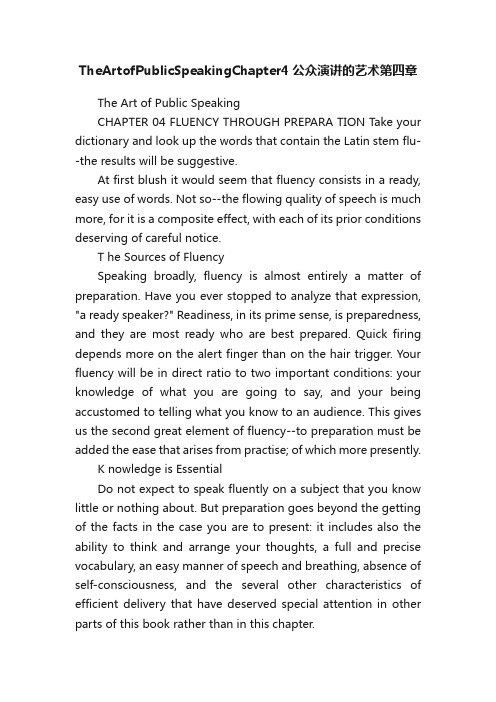
TheArtofPublicSpeakingChapter4公众演讲的艺术第四章The Art of Public SpeakingCHAPTER 04 FLUENCY THROUGH PREPARA TION Take your dictionary and look up the words that contain the Latin stem flu--the results will be suggestive.At first blush it would seem that fluency consists in a ready, easy use of words. Not so--the flowing quality of speech is much more, for it is a composite effect, with each of its prior conditions deserving of careful notice.T he Sources of FluencySpeaking broadly, fluency is almost entirely a matter of preparation. Have you ever stopped to analyze that expression, "a ready speaker?" Readiness, in its prime sense, is preparedness, and they are most ready who are best prepared. Quick firing depends more on the alert finger than on the hair trigger. Your fluency will be in direct ratio to two important conditions: your knowledge of what you are going to say, and your being accustomed to telling what you know to an audience. This gives us the second great element of fluency--to preparation must be added the ease that arises from practise; of which more presently.K nowledge is EssentialDo not expect to speak fluently on a subject that you know little or nothing about. But preparation goes beyond the getting of the facts in the case you are to present: it includes also the ability to think and arrange your thoughts, a full and precise vocabulary, an easy manner of speech and breathing, absence of self-consciousness, and the several other characteristics of efficient delivery that have deserved special attention in other parts of this book rather than in this chapter.Preparation may be either general or specific; usually it should be both. A life-time of reading, of companionship with stirring thoughts, of wrestling with the problems of life--this constitutes a general preparation of inestimable worth. Out of a well-stored mind, and--richer still--a broad experience, and--best of all--a warmly sympathetic heart, the speaker will have to draw much material that no immediate study could provide. The speaker who would speak fluently before an audience should learn to speak fluently and entertainingly with a friend. Clarify your ideas by putting them in words; the talker gains as much from his conversation as the listener. You sometimes begin to converse on a subject thinking you have very little to say, but one idea gives birth to another, and you are surprised to learn that the more you give the more you have to give. This give-and-take of friendly conversation develops mentality, and fluency in expression. Longfellow said: "A single conversation across the table with a wise man is better than ten years' study of books," and Holmes whimsically yet none the less truthfully declared that half the time he talked to find out what he thought. But that method must not be applied on the platform!P ractiseBut preparation must also be of another sort than the gathering, organizing, andshaping of materials--it must include practise, which, like mental preparation, must be both general and special.Do not feel surprised or discouraged if practise on the principles of delivery herein laid down seems to retard your fluency. For a time, this will be inevitable. While you are working for proper inflection, for instance, inflection will be demanding your first thoughts, and the flow of your speech, for the timebeing, will be secondary. This warning, however, is strictly for the closet, for your practise at home. Do not carry any thoughts of inflection with you to the platform. There you must think only of your subject. There is an absolute telepathy between the audience and the speaker. If your thought goes to your gesture, their thought will too. If your interest goes to the quality of your voice, they will be regarding that instead of what your voice is uttering.You have doubtless been adjured to "forget everything but your subject." This advice says either too much or too little. The truth is that while on the platform you must not forget a great many things that are not in your subject, but you must not think of them. Your attention must consciously go only to your message, but subconsciously you will be attending to the points of technique which have become more or less habitual by practise.A nice balance between these two kinds of attention is importantYou can no more escape this law than you can live without air: Your platform gestures, your voice, your inflection, will all be just as good as your habit of gesture, voice, and inflection makes them--no better. Even the thought of whether you are speaking fluently or not will have the effect of marring your flow of speech.Return to the opening chapter, on self-confidence, and again lay its precepts to heart. Learn by rules to speak without thinking of rules. It is not--or ought not to be--necessary for you to stop to think how to say the alphabet correctly, as a matter of fact it is slightly more difficult for you to repeat Z, Y, X than it is to say X, Y, Z--habit has established the order. Just so you must master the laws of efficiency in speaking until it is a second nature for youto speak correctly rather than otherwise. A beginner at the piano has a great deal of trouble with the mechanics of playing, but as time goes on his fingers become trained and almost instinctively wander over the keys correctly. As an inexperienced speaker you will find a great deal of difficulty at first in putting principles into practise, for you will be scared, like the young swimmer, and make some crude strokes, but if you persevere you will "win out."Thus, to sum up, the vocabulary you have enlarged by study, the ease in speaking you have developed by practise, the economy of your well-studied emphasis all will subconsciously come to your aid on the platform. Then the habits you have formed will be earning you a splendid dividend. The fluency of your speech will be at the speed of flow your practise has made habitual.But this means work. What good habit does not? No philosopher's stone that will act as a substitute for laborious practise has ever been found. If it were, it would be thrown away, because it would kill our greatest joy--the delight of acquisition. If public-speaking means to you a fuller life, you will know no greater happiness than a well-spoken speech. The time you have spent in gathering ideas and in private practise of speaking you will find amply rewarded.。
theartofpublicspeakingchapter专题培训课件
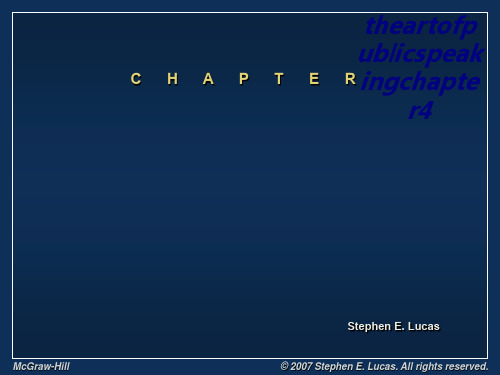
• Clustering (People, places, things, events, processes, concepts, problems, plans/policies)
• Internet Search (Connect to a subject
based search engine such as
• When your general purpose is to inform, you act as a teacher or lecturer. Primary goal: to convey information clearly, accurately, and interestingly.
theartofp ublicspeak C H A P T E R ingchapte
r4
McGraw-Hill
Stephen E. Lucas
© 2007 Stephen E. Lucas. All rights reserved.
Slide 2
Learning objective:
• how to select an appropriate topic and limit it so that you can cover it in the allotted time
• Think about special knowledge or expertise you may have acquired.
McGraw-Hill
© 2007 Stephen E. Lucas. All rights reserved.
Slide 6
Topics You Want to Know More About
The Art of Public Speaking Chapter3——New Words & Questions Part2
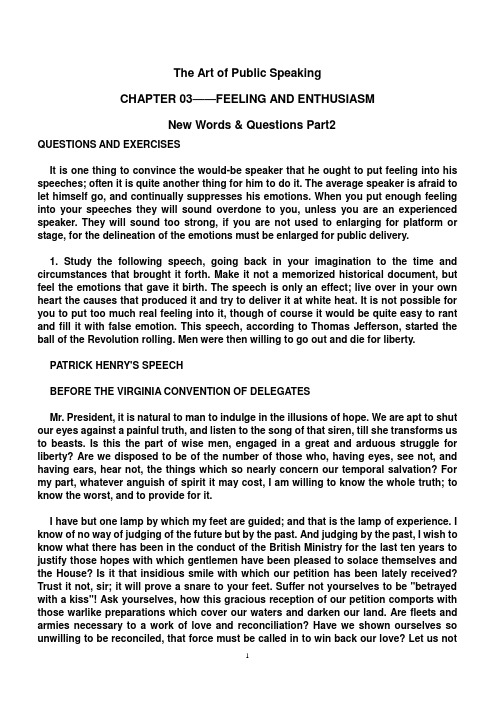
The Art of Public SpeakingCHAPTER 03——FEELING AND ENTHUSIASMNew Words & Questions Part2QUESTIONS AND EXERCISESIt is one thing to convince the would-be speaker that he ought to put feeling into his speeches; often it is quite another thing for him to do it. The average speaker is afraid to let himself go, and continually suppresses his emotions. When you put enough feeling into your speeches they will sound overdone to you, unless you are an experienced speaker. They will sound too strong, if you are not used to enlarging for platform or stage, for the delineation of the emotions must be enlarged for public delivery.1. Study the following speech, going back in your imagination to the time and circumstances that brought it forth. Make it not a memorized historical document, but feel the emotions that gave it birth. The speech is only an effect; live over in your own heart the causes that produced it and try to deliver it at white heat. It is not possible for you to put too much real feeling into it, though of course it would be quite easy to rant and fill it with false emotion. This speech, according to Thomas Jefferson, started the ball of the Revolution rolling. Men were then willing to go out and die for liberty.PATRICK HENRY'S SPEECHBEFORE THE VIRGINIA CONVENTION OF DELEGATESMr. President, it is natural to man to indulge in the illusions of hope. We are apt to shut our eyes against a painful truth, and listen to the song of that siren, till she transforms us to beasts. Is this the part of wise men, engaged in a great and arduous struggle for liberty? Are we disposed to be of the number of those who, having eyes, see not, and having ears, hear not, the things which so nearly concern our temporal salvation? For my part, whatever anguish of spirit it may cost, I am willing to know the whole truth; to know the worst, and to provide for it.I have but one lamp by which my feet are guided; and that is the lamp of experience. I know of no way of judging of the future but by the past. And judging by the past, I wish to know what there has been in the conduct of the British Ministry for the last ten years to justify those hopes with which gentlemen have been pleased to solace themselves and the House? Is it that insidious smile with which our petition has been lately received? Trust it not, sir; it will prove a snare to your feet. Suffer not yourselves to be "betrayed with a kiss"! Ask yourselves, how this gracious reception of our petition comports with those warlike preparations which cover our waters and darken our land. Are fleets and armies necessary to a work of love and reconciliation? Have we shown ourselves so unwilling to be reconciled, that force must be called in to win back our love? Let us notdeceive ourselves, sir. These are the implements of war and subjugation, the last "arguments" to which kings resort.I ask gentlemen, sir, what means this martial array, if its purpose be not to force us to submission? Can gentlemen assign any other possible motive for it? Has Great Britain any enemy in this quarter of the world, to call for all this accumulation of navies and armies? No, sir, she has none. They are meant for us; they can be meant for no other. They are sent over to bind and to rivet upon us those chains which the British Ministry have been so long forging. And what have we to oppose to them? Shall we try argument? Sir, we have been trying that for the last ten years. Have we anything new to offer upon the subject? Nothing. We have held the subject up in every light of which it is capable; but it has been all in vain. Shall we resort to entreaty and humble supplication? What terms shall we find which have not been already exhausted? Let us not, I beseech you, sir, deceive ourselves longer. Sir, we have done everything that could be done, to avert the storm which is now coming on. We have petitioned, we have remonstrated, we have supplicated, we have prostrated ourselves before the throne, and have implored its interposition to arrest the tyrannical hands of the Ministry and Parliament. Our petitions have been slighted; our remonstrances have produced additional violence and insult; our supplications have been disregarded, and we have been spurned with contempt from the foot of the throne. In vain, after these things, may we indulge in the fond hope of peace and reconciliation. There is no longer any room for hope. If we wish to be free, if we mean to preserve inviolate those inestimable privileges for which we have been so long contending; if we mean not basely to abandon the noble struggle in which we have been so long engaged, and which we have pledged ourselves never to abandon until the glorious object of our contest shall be obtained, we must fight; I repeat it, sir, we must fight! An appeal to arms, and to the God of Hosts, is all that is left us!They tell us, sir, that we are weak--"unable to cope with so formidable an adversary"! But when shall we be stronger? Will it be the next week, or the next year? Will it be when we are totally disarmed, and when a British guard shall be stationed in every house? Shall we gather strength by irresolution and inaction? Shall we acquire the means of effectual resistance, by lying supinely on our backs, and hugging the delusive phantom of hope, until our enemies have bound us hand and foot? Sir, we are not weak, if we make a proper use of those means which the God of Nature hath placed in our power. Three millions of people, armed in the holy cause of Liberty, and in such a country as that which we possess, are invincible by any force which our enemy can send against us. Besides, sir, we shall not fight our battles alone. There is a just Power who presides over the destinies of nations, and who will raise up friends to fight our battles for us. The battle, sir, is not to the strong alone; it is to the vigilant, the active, the brave. Besides, sir, we have no election. If we were base enough to desire it, it is now too late to retire from the contest. There is no retreat, but in submission and slavery. Our chains are forged. Their clanking may be heard on the plains of Boston. The war is inevitable; and let it come! I repeat it, sir, let it come! It is in vain, sir, to extenuate the matter. Gentlemen may cry "Peace, peace!" but there is no peace! The war is actually begun! The next gale that sweeps from the north will bring to our ears the clash of resounding arms! Our brethrenare already in the field! Why stand we here idle? What is it that gentlemen wish? What would they have? Is life so dear, or peace so sweet, as to be purchased at the price of chains and slavery? Forbid it, Almighty Powers!--I know not what course others may take; but as for me, give me liberty or give me death!2. Live over in your imagination all the solemnity and sorrow that Lincoln fet at the Gettysburg cemetery. The feeling in this speech is very deep, but it is quieter and more subdued than the preceding one. The purpose of Henry's address was to get action; Lincoln's speech was meant only to dedicate the last resting place of those who had acted. Read it over and over (see page 50) until it burns in your soul. Then commit it and repeat it for emotional expression.3. Beecher's speech on Lincoln, page 76; Thurston's speech on "A Plea for Cuba," page 50; and the following selection, are recommended for practise in developing feeling in delivery.A living force that brings to itself all the resources of imagination, all the inspirations of feeling, all that is influential in body, in voice, in eye, in gesture, in posture, in the whole animated man, is in strict analogy with the divine thought and the divine arrangement; and there is no misconstruction more utterly untrue and fatal than this: that oratory is an artificial thing, which deals with baubles and trifles, for the sake of making bubbles of pleasure for transient effect on mercurial audiences. So far from that, it is the consecration of the whole man to the noblest purposes to which one can address himself--the education and inspiration of his fellow men by all that there is in learning, by all that there is in thought, by all that there is in feeling, by all that there is in all of them, sent home through the channels of taste and of beauty.--HENRY WARD BEECHER.4. What in your opinion are the relative values of thought and feeling in a speech?5. Could we dispense with either?6. What kinds of selections or occasions require much feeling and enthusiasm? Which require little?7. Invent a list of ten subjects for speeches, saying which would give most room for pure thought and which for feeling.8. Prepare and deliver a ten-minute speech denouncing the (imaginary) unfeeling plea of an attorney; he may be either the counsel for the defense or the prosecuting attorney, and the accused may be assumed to be either guilty or innocent, at your option.9. Is feeling more important than the technical principles expounded in chapters III to VII? Why?10. Analyze the secret of some effective speech or speaker. To what is the successdue?11. Give an example from your own observation of the effect of feeling and enthusiasm on listeners.12. Memorize Carlyle's and Emerson's remarks on enthusiasm.13. Deliver Patrick Henry's address, page 110, and Thurston's speech, page 50, without show of feeling or enthusiasm. What is the result?14. Repeat, with all the feeling these selections demand. What is the result?15. What steps do you intend to take to develop the power of enthusiasm and feeling in speaking?16. Write and deliver a five-minute speech ridiculing a speaker who uses bombast, pomposity and over-enthusiasm. Imitate him.。
The Art of Public Speaking Chapter5 公众演讲的艺术
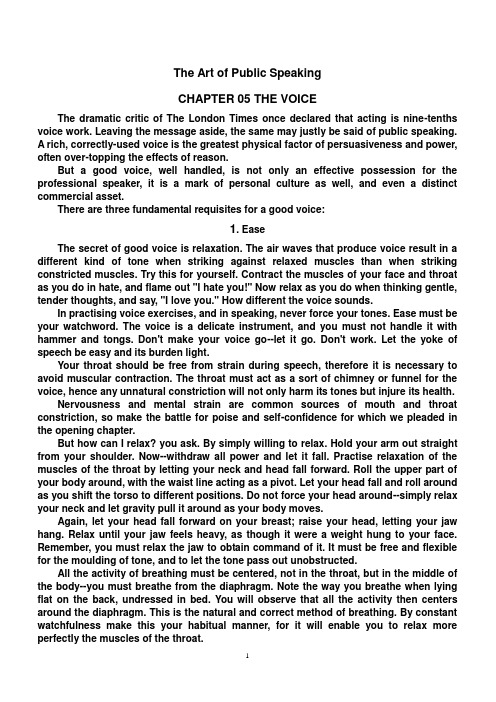
The Art of Public SpeakingCHAPTER 05 THE VOICEThe dramatic critic of The London Times once declared that acting is nine-tenths voice work. Leaving the message aside, the same may justly be said of public speaking.A rich, correctly-used voice is the greatest physical factor of persuasiveness and power, often over-topping the effects of reason.But a good voice, well handled, is not only an effective possession for the professional speaker, it is a mark of personal culture as well, and even a distinct commercial asset.There are three fundamental requisites for a good voice:1. EaseThe secret of good voice is relaxation. The air waves that produce voice result in a different kind of tone when striking against relaxed muscles than when striking constricted muscles. Try this for yourself. Contract the muscles of your face and throat as you do in hate, and flame out "I hate you!" Now relax as you do when thinking gentle, tender thoughts, and say, "I love you." How different the voice sounds.In practising voice exercises, and in speaking, never force your tones. Ease must be your watchword. The voice is a delicate instrument, and you must not handle it with hammer and tongs. Don't make your voice go--let it go. Don't work. Let the yoke of speech be easy and its burden light.Your throat should be free from strain during speech, therefore it is necessary to avoid muscular contraction. The throat must act as a sort of chimney or funnel for the voice, hence any unnatural constriction will not only harm its tones but injure its health.Nervousness and mental strain are common sources of mouth and throat constriction, so make the battle for poise and self-confidence for which we pleaded in the opening chapter.But how can I relax? you ask. By simply willing to relax. Hold your arm out straight from your shoulder. Now--withdraw all power and let it fall. Practise relaxation of the muscles of the throat by letting your neck and head fall forward. Roll the upper part of your body around, with the waist line acting as a pivot. Let your head fall and roll around as you shift the torso to different positions. Do not force your head around--simply relax your neck and let gravity pull it around as your body moves.Again, let your head fall forward on your breast; raise your head, letting your jaw hang. Relax until your jaw feels heavy, as though it were a weight hung to your face. Remember, you must relax the jaw to obtain command of it. It must be free and flexible for the moulding of tone, and to let the tone pass out unobstructed.All the activity of breathing must be centered, not in the throat, but in the middle of the body--you must breathe from the diaphragm. Note the way you breathe when lying flat on the back, undressed in bed. You will observe that all the activity then centers around the diaphragm. This is the natural and correct method of breathing. By constant watchfulness make this your habitual manner, for it will enable you to relax more perfectly the muscles of the throat.The next fundamental requisite for good voice is2. OpennessIf the muscles of the throat are constricted, the tone passage partially closed, and the mouth kept half-shut, how can you expect the tone to come out bright and clear, or even to come out at all? Sound is a series of waves, and if you make a prison of your mouth, holding the jaws and lips rigidly, it will be very difficult for the tone to squeeze through, and even when it does escape it will lack force and carrying power. Open your mouth wide, relax all the organs of speech, and let the tone flow out easily.Start to yawn, but instead of yawning, speak while your throat is open. Make this open-feeling habitual when speaking--we say make because it is a matter of resolution and of practise, if your vocal organs are healthy.The final fundamental requisite for good voice is3. ForwardnessA voice that is pitched back in the throat is dark, sombre, and unattractive. The tone must be pitched forward, but do not force it forward. You will recall that our first principle was ease. Think the tone forward and out. Believe it is going forward, and allow it to flow easily. You can tell whether you are placing your tone forward or not by inhaling a deep breath and singing ah with the mouth wide open, trying to feel the little delicate sound waves strike the bony arch of the mouth just above the front teeth. The sensation is so slight that you will probably not be able to detect it at once, but persevere in your practise, always thinking the tone forward, and you will be rewarded by feeling your voice strike the roof of your mouth. A correct forward-placing of the tone will do away with the dark, throaty tones that are so unpleasant, inefficient, and harmful to the throat.Close the lips, humming ng, im, or an. Think the tone forward. Do you feel it strike the lips?Hold the palm of your hand in front of your face and say vigorously crash, dash, whirl, buzz. Can you feel the forward tones strike against your hand? Practise until you can. Remember, the only way to get your voice forward is to put it forward.H ow to Develop the Carrying Power of the VoiceIt is not necessary to speak loudly in order to be heard at a distance. It is necessary only to speak correctly. Edith Wynne Matthison's voice will carry in a whisper throughout a large theater. A paper rustling on the stage of a large auditorium can be heard distinctly in the furthermost seat in the gallery. If you will only use your voice correctly, you will not have much difficulty in being heard. Of course it is always well to address your speech to your furthest auditors; if they get it, those nearer will have no trouble, but aside from this obvious suggestion, you must observe these laws of voice production: Remember to apply the principles of ease, openness and forwardness--they are the prime factors in enabling your voice to be heard at a distance.Do not gaze at the floor as you talk. This habit not only gives the speaker an amateurish appearance but if the head is hung forward the voice will be directed towards the ground instead of floating out over the audience.Voice is a series of air vibrations. To strengthen it two things are necessary: more airor breath, and more vibration.Breath is the very basis of voice. As a bullet with little powder behind it will not have force and carrying power, so the voice that has little breath behind it will be weak. Not only will deep breathing--breathing from the diaphragm--give the voice a better support, but it will give it a stronger resonance by improving the general health.Usually, ill health means a weak voice, while abundant physical vitality is shown through a strong, vibrant voice. Therefore anything that improves the general vitality is an excellent voice strengthener, provided you use the voice properly. Authorities differ on most of the rules of hygiene but on one point they all agree: vitality and longevity are increased by deep breathing. Practise this until it becomes second nature. Whenever you are speaking, take in deep breaths, but in such a manner that the inhalations will be silent.Do not try to speak too long without renewing your breath. Nature care for this pretty well unconsciously in conversation, and she will do the same for you in platform speaking if you do not interfere with her premonitions.A certain very successful speaker developed voice carrying power by running across country, practising his speeches as he went. The vigorous exercise forced him to take deep breaths, and developed lung power. A hard-fought basketball or tennis game is an efficient way of practising deep breathing. When these methods are not convenient, we recommend the following:Place your hands at your sides, on the waist line.By trying to encompass your waist with your fingers and thumbs, force all the air out of the lungs.Take a deep breath. Remember, all the activity is to be centered in the middle of the body; do not raise the shoulders. As the breath is taken your hands will be forced out.Repeat the exercise, placing your hands on the small of the back and forcing them out as you inhale.Many methods for deep breathing have been given by various authorities. Get the air into your lungs--that is the important thing.The body acts as a sounding board for the voice just as the body of the violin acts as a sounding board for its tones. You can increase its vibrations by practise.Place your finger on your lip and hum the musical scale, thinking and placing the voice forward on the lips. Do you feel the lips vibrate? After a little practise they will vibrate, giving a tickling sensation.Repeat this exercise, throwing the humming sound into the nose. Hold the upper part of the nose between the thumb and forefinger. Can you feel the nose vibrate?Placing the palm of your hand on top of your head, repeat this humming exercise. Think the voice there as you hum in head tones. Can you feel the vibration there?Now place the palm of your hand on the back of your head, repeating the foregoing process. Then try it on the chest. Always remember to think your tone where you desire to feel the vibrations. The mere act of thinking about any portion of your body will tend to make it vibrate.Repeat the following, after a deep inhalation, endeavoring to feel all portions of your body vibrate at the same time. When you have attained this you will find that it is a pleasant sensation.What ho, my jovial mates. Come on! We will frolic it like fairies, frisking in the merry moonshine.P urity of VoiceThis quality is sometimes destroyed by wasting the breath. Carefully control the breath, using only as much as is necessary for the production of tone. Utilize all that you give out. Failure to do this results in a breathy tone. Take in breath like a prodigal; in speaking, give it out like a miser.V oice SuggestionsNever attempt to force your voice when hoarse.Do not drink cold water when speaking. The sudden shock to the heated organs of speech will injure the voice.Avoid pitching your voice too high--it will make it raspy. This is a common fault. When you find your voice in too high a range, lower it. Do not wait until you get to the platform to try this. Practise it in your daily conversation. Repeat the alphabet, beginning A on the lowest scale possible and going up a note on each succeeding letter, for the development of range. A wide range will give you facility in making numerous changes of pitch.Do not form the habit of listening to your voice when speaking. You will need your brain to think of what you are saying--reserve your observation for private practise.。
The Art of Public Speaking Chapter1

The Art of Public SpeakingCHAPTER 01 ACQUIRING CONFIDENCE BEFORE AN AUDIENCE Students of public speaking continually ask, "How can I overcome self-consciousness and the fear that paralyzes me before an audience?"Face an audience as frequently as you can. You can never attain freedom from stage-fright by reading a treatise. A book may give you excellent suggestions on how best to conduct yourself in the water, but sooner or later you must get wet, perhaps even strangle and be "half scared to death." There are a great many "wetless" bathing suits worn at the seashore, but no one ever learns to swim in them. To plunge is the only way.Practise, practise, practise in speaking before an audience will tend to remove all fear of audiences, just as practise in swimming will lead to confidence and facility in the water. You must learn to speak by speaking.All we can do here is to offer you suggestions as to how best to prepare for your plunge. The real plunge no one can take for you. A doctor may prescribe, but you must take the medicine.Do not be disheartened if at first you suffer from stage-fright. For one reason or another, some master-speakers never entirely overcome stage-fright, but it will pay you to spare no pains to conquer it. One way to get air out of a glass is to pour in water.B e Absorbed by Your SubjectIf you feel deeply about your subject you will be able to think of little else. Concentration is a process of distraction from less important matters. It is too late to think about the cut of your coat when once you are upon the platform, so centre your interest on what you are about to say--fill your mind with your speech-material and, like the infilling water in the glass, it will drive out your unsubstantial fears.Self-consciousness is undue consciousness of self, and, for the purpose of delivery, self is secondary to your subject, not only in the opinion of the audience, but, if you are wise, in your own. To hold any other view is to regard yourself as an exhibit instead of as a messenger with a message worth delivering.Far worse than self-consciousness through fear of doing poorly is self-consciousness through assumption of doing well. The first sign of greatness is when a man does not attempt to look and act great.Nothing advertises itself so thoroughly as conceit. One may be so full of self as to be empty. Voltaire said, "We must conceal self-love." But that can not be done. You know this to be true, for you have recognized overweening self-love in others. If you have it, others are seeing it in you. There are things in this world bigger than self, and in working for them self will be forgotten, or--what is better--remembered only so as to help us win toward higher things.H ave Something to SayThe trouble with many speakers is that they go before an audience with their minds a blank. It is no wonder that nature, abhorring a vacuum, fills them with the nearest thing handy, which generally happens to be, "I wonder if I am doing this right! How does myhair look? I know I shall fail." Their prophetic souls are sure to be right.It is not enough to be absorbed by your subject--to acquire self-confidence you must have something in which to be confident. If you go before an audience without any preparation, or previous knowledge of your subject, you ought to be self-conscious--you ought to be ashamed to steal the time of your audience. Prepare yourself. Know what you are going to talk about, and, in general, how you are going to say it. Have the first few sentences worked out completely so that you may not be troubled in the beginning to find words. Know your subject better than your hearers know it, and you have nothing to fear.A fter Preparing for Success, Expect ItLet your bearing be modestly confident, but most of all be modestly confident within. Over-confidence is bad, but to tolerate premonitions of failure is worse, for a bold man may win attention by his very bearing, while a rabbit-hearted coward invites disaster.Washington Irving once introduced Charles Dickens at a dinner given in the latter's honor. In the middle of his speech Irving hesitated, became embarrassed, and sat down awkwardly. Turning to a friend beside him he remarked, "There, I told you I would fail, and I did." If you believe you will fail, there is no hope for you. You will.A ssume Mastery Over Your AudienceIn public speech, as in electricity, there is a positive and a negative force. Either you or your audience are going to possess the positive factor. If you assume it you can almost invariably make it yours. If you assume the negative you are sure to be negative. Assuming a virtue or a vice vitalizes it. Summon all your power of self-direction, and remember that though your audience is infinitely more important than you, the truth is more important than both of you, because it is eternal. If your mind falters in its leadership the sword will drop from your hands. Your assumption of being able to instruct or lead or inspire a multitude or even a small group of people may appall you as being colossal impudence--as indeed it may be; but having once essayed to speak, be courageous. BE courageous--it lies within you to be what you will.M AKE yourself be calm and confidentReflect that your audience will not hurt you.In facing your audience, pause a moment and look them over--a hundred chances to one they want you to succeed, for what man is so foolish as to spend his time, perhaps his money, in the hope that you will waste his investment by talking dully?C oncluding HintsDo not make haste to begin--haste shows lack of control.Do not apologize. It ought not to be necessary; and if it is, it will not help. Go straight ahead.Take a deep breath, relax, and begin in a quiet conversational tone as though you were speaking to one large friend. You will not find it half so bad as you imagined; really, it is like taking a cold plunge: after you are in, the water is fine. In fact, having spoken a few times you will even anticipate the plunge with exhilaration. To stand before anaudience and make them think your thoughts after you is one of the greatest pleasures you can ever know. Instead of fearing it, you ought to be as anxious as the fox hounds straining at their leashes, or the race horses tugging at their reins.So cast out fear, for fear is cowardly--when it is not mastered. The bravest know fear, but they do not yield to it. Face your audience pluckily--if your knees quake, MAKE them stop. In your audience lies some victory for you and the cause you represent. Go win it. The world owes its progress to the men who have dared, and you must dare to speak the effective word that is in your heart to speak--for often it requires courage to utter a single sentence. But remember that men erect no monuments and weave no laurels for those who fear to do what they can.No one doubts that temperament and nerves and illness and even praiseworthy modesty may, singly or combined, cause the speaker's cheek to blanch before an audience, but neither can any one doubt that coddling will magnify this weakness. The victory lies in a fearless frame of mind.。
Theartofpublicspeakingchapter
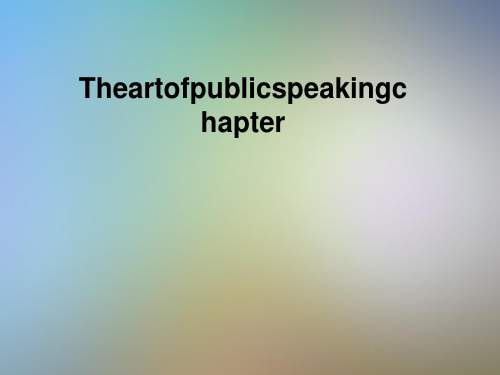
Chapter Two Speaking
Confidently •aLnedaErntihnigcally
Objectives:
• Skills and information to speak confidently
• Skills and information to speak ethically
posture, gestures, distractions)
Conversation Spontaneous Muted Comfortable Equal Shared Roles Spontaneous
(free, back&forth) Unstructured
Stable Environment Multiple Channels
•加入jobs和马 云的照片
Genre of public
asrtpisetiac king
expression (song, poetry, play)
persuasion
advising
inspiringarguentationPS & intercultural communicative competence
The Secret to • TShue csccreipst s
• Exercise
• orator • rhetoric • Intercultural communicative competence • frame of reference • communication process • What is a good public speech?
The means by which a message is communicated.
The-art-of-public-speaking-chapter-1-.2-.3PPT优秀课件

10%
• Lecture Report
20%
• Class Activity Participation 20%
• Speech Writing
20%
• Speech Presentation
30%
McGraw-Hill
© 2007 Stephen E. Lucas. All rights reserved.
Chinese heritage
English Language
To respect diversity of culture√ Avoid ethnocentrism√
McGraw-Hill
© 2007 Stephen E. Lucas. All rights reserved.
Slide 8
Cultural Diversity and Public Speaking
•Even meanings attached to gestures for such basic messages as “yes” and “no” are culturally based.
McGraw-Hill
© 2007 Stephen E. Lucas. All rights reserved.
•Speechmaking becomes more complex as cultural diversity increases.
•Not only do words change from language to language, but so do ways of thinking and of seeing the world.
public speaking
job hunting
The Art of Public Speaking Chapter1——New Words & Questions

The Art of Public SpeakingCHAPTER 01 ACQUIRING CONFIDENCE BEFORE AN AUDIENCENew Words & Questionscontinually adv. 不停地;持续地;屡屡地;一再地consciousness n. 意识,观念;知觉;觉悟;感觉paralyze vt. 使瘫痪,使麻痹;使不能正常活动attain vt. vi. 达到,获得;遂愿;经过努力到达某事物treatise n. 论文;论述;专著conduct vt. vi. 引导;带领;控制;传导strangle vt. 扼死,勒死,绞死;使…窒息;抑制;压制vi. 窒息而死,被勒死plunge vt. 用力插入;使陷入vi. 跳入;全心投入;突降,俯冲facility n. 设备;容易;能力;灵巧prescribe .vt. 指定,规定;指定,规定vi. 建立规定,法律或指示;开处方,给医嘱disheartened adj. 沮丧的,灰心的conquer vt. 征服;攻克;打败(敌人);克服vi. 得胜,胜利pour vt. 涌出;倾,倒vi. 涌流;泛滥,涌出;斟,倒absorb vt. 吸收(液体、气体等);吸引(注意);吞并,合并;忍受,承担(费用)concentration n. 集中;专心;关注;浓度distraction n. 注意力分散;娱乐,消遣;心烦意乱;精神错乱unsubstantial adj. 无实质的,不坚固的,薄弱的consciousness n. 意识,观念;知觉;觉悟;感觉undue adj. 过度的,过分的;不适当的;未到期的;逾分delivery n. 传送,投递;[法](正式)交付;分娩;讲演assumption n. 假定,假设;承担;想当然;采取advertise vt. 做广告,做宣传;通告,通知;宣扬conceit n. 自负;幻想;思想,观点;巧妙构思conceal vt. 隐藏,隐瞒,遮住overween vi. [古语]自负,傲慢,自以为了不起abhorring v. 憎恨(厌恶)prophetic adj. 预言的,先知的;先兆的bearing n. [机]轴承,支座;关系;方位;态度,举止modestly .adv. 谦虚地,审慎地;适度地tolerate vt. 容许;承认;忍受;容忍(不同意或不喜欢的事物)premonition n. 预感,预兆;前兆,征兆;预先的警告(告诫),预诫coward n. 懦夫,胆怯者cowardly adj. 怯懦的;胆小的;懦弱的adv. 怯懦地;胆怯地disaster n. 灾难;彻底的失败;不幸;祸患awkwardly adv. 笨拙地;困难地;难看地;尴尬地invariably adv. 总是;不变的;“invariable”的派生;无不virtue n. 美德;德行;价值;长处vice n. 恶习;不道德行为;(肉体的)缺陷,瑕疵prep. 代替;取代adj. 副的;代替的vitalize vt. 赋予生命; 给予…生命;使有生气; 激发summon vt. 传唤,召唤;鼓起(勇气);传讯(出庭);[军]劲降,招降infinitely adv. 无限地,无穷地;极其eternal adj. 永恒的;似乎不停的,不朽的n. 永恒的事物;Eternal 上帝,与定冠词the 连用falter vi. (嗓音)颤抖;支吾其词;蹒跚;摇晃n. 支吾,结巴;踌躇,不稳;摇晃;颤抖sword n. 剑,刀;武力,战争;兵权,权力multitude n. 大量,许多;大众,人群appall vt. 美使惊骇,使充满恐惧colossal adj. 巨大的;(口语)异常的impudence n. 粗鲁,放肆,无礼的言行essay n. 散文;随笔,杂记文;尝试,企图;试验vt. 尝试;试验courageous adj. 勇敢的,无畏的;有胆量的;英勇的reflect vt. vi. 反射(光、热、声或影像);考虑chance n. 机会,机遇;概率,可能性;偶然,运气v. 偶然发生;冒险;碰巧adj. 意外的;碰巧的dully adv. 迟钝地;沉闷地;呆滞地;乏味地hint n. 线索,迹象;提示,注意事项;暗示;微量vt. 暗示vi. 暗示,提示hesitate vi. 犹豫,踌躇;不愿;支吾;停顿vt. 对…犹豫;不情愿haste n. 匆忙,急忙;急速,紧迫;轻率v. 赶紧,匆忙;古使快,催促anticipate vt. 预感;预见;预料;先于…行动vi. 过早地提出;(在口头或用文字)预言... exhilaration n. 愉快的心情,高兴;豪兴hound vt. 追猎;不断侵扰,烦扰;激励;嗾使,煽动strain vt. vi. 拉紧,拉伤;用力拉leash n. 拴猎狗的皮带tug vt. vi. 用力拉,使劲拉;使劲,挣扎;[航海]用拖船拖曳;竞争rein n. 驾驭(法);统治手段;控制(权);缰绳yield vt. 屈服,投降;生产;获利;不再反对pluckily adv. 有勇气地,大胆地quake vi. 发抖,颤抖;摇动,震动represent vt. 表现,象征;代表,代理;扮演;作为示范vi. 代表;提出异议to owe sth to sth 是固定搭配,“把...归功于..”utter vt. 发出声音;说,讲;出版(书籍)等;[法]流通使用adj. 彻底的,完全的,绝对的monument n. 纪念碑;遗迹;遗址;丰碑weave vt. vi. 编,织;迂回行进;穿行(以避开障碍)laurel n. (表示荣誉的)桂冠,光荣;[体]〈美〉(比赛的)胜利;[植]月桂树temperament n. 性格;(人或动物的)气质;易冲动;(性情)暴躁nerve n. 神经;勇气,胆量;[植] 叶脉;中枢blanch vt. 使变白;[冶]酸洗(金属)使有光泽;[烹]... vi. 漂白;发白;变白coddle vt. 悉心照料,娇惯magnify vt. 放大;赞美;夸大;夸奖vi. 放大;有放大能力frame n. 框架;眼镜框;组织;边框Voltaire 伏尔泰法国思想家、文学家、哲学家Washington Irving 华盛顿·欧文简介:华盛顿·欧文是19世纪美国最著名的作家,号称美国文学之父。
The Art of Public Speaking Chapter4——New Words & Questions Part2
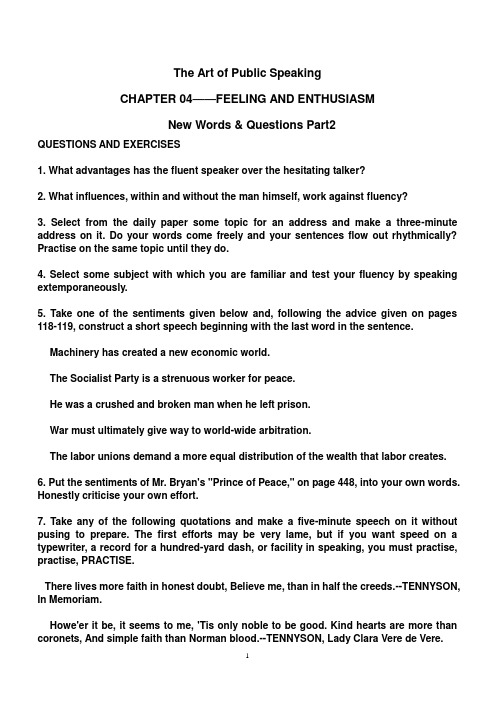
The Art of Public SpeakingCHAPTER 04——FEELING AND ENTHUSIASMNew Words & Questions Part2QUESTIONS AND EXERCISES1. What advantages has the fluent speaker over the hesitating talker?2. What influences, within and without the man himself, work against fluency?3. Select from the daily paper some topic for an address and make a three-minute address on it. Do your words come freely and your sentences flow out rhythmically? Practise on the same topic until they do.4. Select some subject with which you are familiar and test your fluency by speaking extemporaneously.5. Take one of the sentiments given below and, following the advice given on pages 118-119, construct a short speech beginning with the last word in the sentence.Machinery has created a new economic world.The Socialist Party is a strenuous worker for peace.He was a crushed and broken man when he left prison.War must ultimately give way to world-wide arbitration.The labor unions demand a more equal distribution of the wealth that labor creates. 6. Put the sentiments of Mr. Bryan's "Prince of Peace," on page 448, into your own words. Honestly criticise your own effort.7. Take any of the following quotations and make a five-minute speech on it without pusing to prepare. The first efforts may be very lame, but if you want speed on a typewriter, a record for a hundred-yard dash, or facility in speaking, you must practise, practise, PRACTISE.There lives more faith in honest doubt, Believe me, than in half the creeds.--TENNYSON, In Memoriam.Howe'er it be, it seems to me, 'Tis only noble to be good. Kind hearts are more than coronets, And simple faith than Norman blood.--TENNYSON, Lady Clara Vere de Vere.'Tis distance lends enchantment to the view And robes the mountain in its azure hue.--CAMPBELL, Pleasures of Hope.His best companions, innocence and health, And his best riches, ignorance of wealth.--GOLDSMITH, The Deserted Village.Beware of desperate steps! The darkest day, Live till tomorrow, will have passed away.--COWPER, Needless Alarm.My country is the world, and my religion is to do good.--PAINE, Rights of Man.Trade it may help, society extend, But lures the pirate, and corrupts the friend: It raises armies in a nation's aid, But bribes a senate, and the land's betray'd.--POPE, Moral Essays.[5]O God, that men should put an enemy in their mouths to steal away their brains!--SHAKESPEARE, Othello.It matters not how strait the gate, How charged with punishment the scroll, I am the master of my fate, I am the captain of my soul.--HENLEY, Invictus.The world is so full of a number of things, I am sure we should all be happy as kings.--STEVENSON, A Child's Garden of Verses.If your morals are dreary, depend upon it they are wrong.--STEVENSON, Essays.Every advantage has its tax. I learn to be content.--EMERSON, Essays.8. Make a two-minute speech on any of the following general subjects, but you will find that your ideas will come more readily if you narrow your subject by taking some specific phase of it. For instance, instead of trying to speak on "Law" in general, take the proposition, "The Poor Man Cannot Afford to Prosecute;" or instead of dwelling on "Leisure," show how modern speed is creating more leisure. In this way you may expand this subject list indefinitely.GENERAL THEMESLaw. Politics. Woman's Suffrage. Initiative and Referendum. A Larger Navy. War. Peace. Foreign Immigration. The Liquor Traffic. Labor Unions. Strikes. Socialism. Single Tax. Tariff. Honesty. Courage. Hope. Love. Mercy. Kindness. Justice. Progress. Machinery. Invention. Wealth. Poverty. Agriculture. Science. Surgery. Haste. Leisure. Happiness. Health. Business. America. The Far East. Mobs. Colleges. Sports. Matrimony. Divorce. Child Labor. Education. Books. The Theater. Literature. Electricity. Achievement. Failure. Public Speaking. Ideals. Conversation. The Most Dramatic Moment of My Life. My Happiest Days. Things Worth While. What I Hope to Achieve. My Greatest Desire.What I Would Do with a Million Dollars. Is Mankind Progressing? Our Greatest Need.。
The Art of Public Speaking
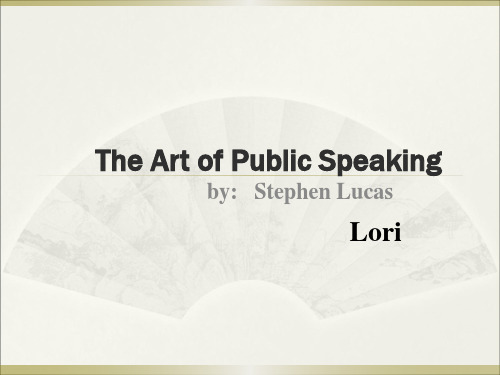
Developing confidence
One of the major concerns of students in any speech class is stage fright.
If you are worried about stage fright, you may feel better knowing that you are not alone.
Similarities between public speaking and conversation
1. Organizing your thoughts logically.
2. Tailoring your message to your audience 3. Telling a story for maximum impact 4. Adapting to listener feedback
Situation
The time and place in which speech communication occurs
Listening
Listening is important Listening and critical thinking Four cases of poor listening How to become a better listener
Verbal message
Narrow your topic down Do research and choose supporting details to make your ideas clear and convincing Organize your ideas so listeners can follow them without getting lost Express your message in words that are accurate, clear, vivid, and appropriate
the art of ublic speaking chapter
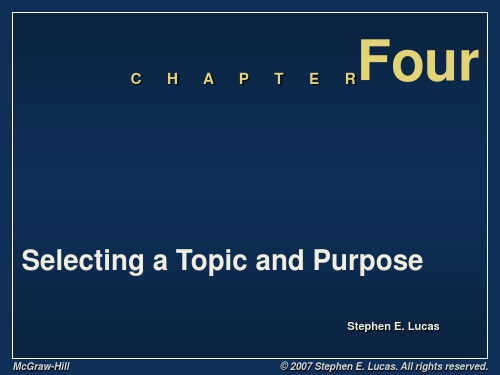
© 2007 Stephen E. Lucas. All rights reserved.
Slide 10
Determining the General Purpose
• The broad goal of a speech. The three major kinds of general purposes are to inform, to persuade, and to entertain.
• There are two broad categories of potential topics for your speeches:
– 1. Subjects you know a lot about
– 2. Subjects you want to know more about.
McGraw-Hill
– Topic: Computers – General Purpose: To inform. – Specific Purpose: To inform my audience of the
major factors to consider when buying a notebook computer.
– Ineffective: To inform my audience about the Civil War.
– More Effective: – To inform my audience about the role of
African-American soldiers in the Civil War.
McGraw-Hill
© 2007 Stephen E. Lucas. All rights reserved.
theartofpublicspeakingchapter3
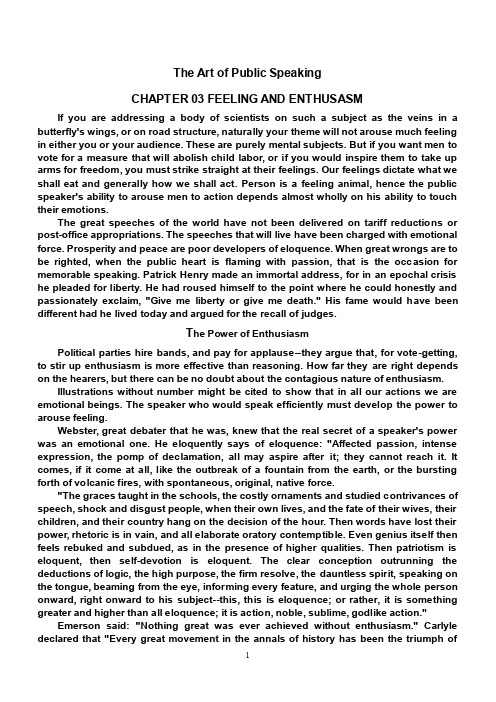
The Art of Public SpeakingCHAPTER 03 FEELING AND ENTHUSASMIf you are addressing a body of scientists on such a subject as the veins in a butterfly's wings, or on road structure, naturally your theme will not arouse much feeling in either you or your audience. These are purely mental subjects. But if you want men to vote for a measure that will abolish child labor, or if you would inspire them to take up arms for freedom, you must strike straight at their feelings. Our feelings dictate what we shall eat and generally how we shall act. Person is a feeling animal, hence the public speaker's ability to arouse men to action depends almost wholly on his ability to touch their emotions.The great speeches of the world have not been delivered on tariff reductions or post-office appropriations. The speeches that will live have been charged with emotional force. Prosperity and peace are poor developers of eloquence. When great wrongs are to be righted, when the public heart is flaming with passion, that is the occasion for memorable speaking. Patrick Henry made an immortal address, for in an epochal crisis he pleaded for liberty. He had roused himself to the point where he could honestly and passionately exclaim, "Give me liberty or give me death." His fame would have been different had he lived today and argued for the recall of judges.T he Power of EnthusiasmPolitical parties hire bands, and pay for applause--they argue that, for vote-getting, to stir up enthusiasm is more effective than reasoning. How far they are right depends on the hearers, but there can be no doubt about the contagious nature of enthusiasm.Illustrations without number might be cited to show that in all our actions we are emotional beings. The speaker who would speak efficiently must develop the power to arouse feeling.Webster, great debater that he was, knew that the real secret of a speaker's power was an emotional one. He eloquently says of eloquence: "Affected passion, intense expression, the pomp of declamation, all may aspire after it; they cannot reach it. It comes, if it come at all, like the outbreak of a fountain from the earth, or the bursting forth of volcanic fires, with spontaneous, original, native force."The graces taught in the schools, the costly ornaments and studied contrivances of speech, shock and disgust people, when their own lives, and the fate of their wives, their children, and their country hang on the decision of the hour. Then words have lost their power, rhetoric is in vain, and all elaborate oratory contemptible. Even genius itself then feels rebuked and subdued, as in the presence of higher qualities. Then patriotism is eloquent, then self-devotion is eloquent. The clear conception outrunning the deductions of logic, the high purpose, the firm resolve, the dauntless spirit, speaking on the tongue, beaming from the eye, informing every feature, and urging the whole person onward, right onward to his subject--this, this is eloquence; or rather, it is something greater and higher than all eloquence; it is action, noble, sublime, godlike action."Emerson said: "Nothing great was ever achieved without enthusiasm." Carlyle declared that "Every great movement in the annals of history has been the triumph ofenthusiasm." It is as contagious as measles. Eloquence is half inspiration. Sweep your audience with you in a pulsation of enthusiasm. Let yourself go. "A man," said Oliver Cromwell, "never rises so high as when he knows not whither he is going."H ow are We to Acquire and Develop Enthusiasm?There is only one way to get feeling into your speaking--and whatever else you forget, forget not this: You must actually ENTER INTO the character you impersonate, the cause you advocate, the case you argue--enter into it so deeply that it clothes you, enthralls you, possesses you wholly. Then you are, in the true meaning of the word, in sympathy with your subject, for its feeling is your feeling, you "feel with" it, and therefore your enthusiasm is both genuine and contagious. Genuine feeling in a speech is bone and blood of the speech itself and not something that may be added to it or substracted at will. In the ideal address theme, speaker and audience become one, fused by the emotion and thought of the hour.T he Need of Sympathy for HumanityThe seal and sign of greatness is a desire to serve others. Self-preservation is the first law of life, but self-abnegation is the first law of greatness--and of art. Selfishness is the fundamental cause of all sin, it is the thing that all great religions, all worthy philosophies, have struck at. Out of a heart of real sympathy and love come the speeches that move humanity.As Daniel Webster said, it is of no use to try to pretend to sympathy or feelings. It cannot be done successfully. "Nature is forever putting a premium on reality." What is false is soon detected as such. The thoughts and feelings that create and mould the speech in the study must be born again when the speech is delivered from the platform. Do not let your words say one thing, and your voice and attitude another. There is no room here for half-hearted, nonchalant methods of delivery. Sincerity is the very soul of eloquence.。
the art of public speaking chapter
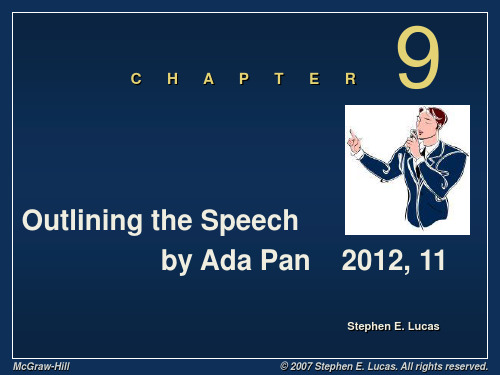
Introduction
Preparation
Connectives Main Points – in full declarative sentences.
Outline Brings Together All Of
Supporting Points – in full declarative The Major
McGraw-Hill
© 2007 Stephen E. Lucas. All rights reserved.
• Follow the visual framework used in the preparation outline
• Keep the outline as brief as possible • Write clearly and legibly • Add cues for delivery
Slide 10
Tips for Preparing a Preparation Outline
• Use complete sentences
• Label the introduction, body, conclusion and connectives
• Use a consistent pattern of symbols and indentation
McGraw-Hill
© 2007 Stephen E. Lucas. All rights reserved.
Slide 12
The Preparation Outline
A detailed outline developed during the process of speech preparation that includes the title, specific purpose, central idea, main points, subpoints, connectives, conclusion, and bibliography of a speech
- 1、下载文档前请自行甄别文档内容的完整性,平台不提供额外的编辑、内容补充、找答案等附加服务。
- 2、"仅部分预览"的文档,不可在线预览部分如存在完整性等问题,可反馈申请退款(可完整预览的文档不适用该条件!)。
- 3、如文档侵犯您的权益,请联系客服反馈,我们会尽快为您处理(人工客服工作时间:9:00-18:30)。
McGraw-Hill
© 2007 Stephen E. Lucas. All rights reserved.
Slide 12
The Preparation Outline
A detailed outline developed during the process of speech preparation that includes the titl idea, main points, subpoints, connectives, conclusion, and bibliography of a speech
Slide 10
Tips for Preparing a Preparation Outline
• Use complete sentences
• Label the introduction, body, conclusion and connectives
• Use a consistent pattern of symbols and indentation
ideas from one to another – Help create coherent structure
McGraw-Hill
© 2007 Stephen E. Lucas. All rights reserv4ed.
Outlining Your Speech
Chapter 11
Six Components of the Preparation Outline
• Follow the visual framework used in the preparation outline
• Keep the outline as brief as possible • Write clearly and legibly • Add cues for delivery
McGraw-Hill
© 2007 Stephen E. Lucas. All rights reserved.
Slide 11
The Speaking Outline
The speaking outline:
a condensed form of the preparation outline used to help the speaker remember his or her ideas as they speak.
McGraw-Hill
© 2007 Stephen E. Lucas. All rights reserved.
Outlining Your Speech
Chapter 11
Outlining Your Speech
Chapter 11
Slide 15
Tips for Preparing the Speaking Outline
McGraw-Hill
© 2007 Stephen E. Lucas. All rights reserved.
Slide 4
OUTLINING THE SPEECH
• Outlines Are Essential To Effective Speeches
– Help place related items together – Help ensure the natural flow of
• State the main points and submain points in full sentences
• Label transitions, internal summarizes and internal previews
McGraw-Hill
© 2007 Stephen E. Lucas. All rights reserved.
© 2007 Stephen E. Lucas. All rights reserved.
Slide 3
Learning Objectives
• the preparation outline (detailed for planning)
• the speaking outline (brief for delivery)
sentences. Conclusion Bibliography
Elements Of The Speech
McLGCrCaCwE-HNiGll 111
KimAlyse Popkave, M.Ed., CMI, CPPC
Instructor © 2007 Stephen E. Lucas. All rights reserv9ed.
CHAPTER
9
Outlining the Speech by Ada Pan 2012, 11
McGraw-Hill
Stephen E. Lucas
© 2007 Stephen E. Lucas. All rights reserved.
Slide 2
McGraw-Hill
Take Action
Title, specific purpose and thesis statement Introduction Main points, subpoints, and sub-subpoints Conclusion Connectives Works cited
Outlining Your Speech
Chapter 11
Outlining Your Speech
Chapter 11
Outlining Your Speech
Chapter 11
Slide 9
OUTLINING THE SPEECH
Title Specific Purpose Central Idea
• Process of Building The
Introduction
Preparation
Connectives Main Points – in full declarative sentences.
Outline Brings Together All Of
Supporting Points – in full declarative The Major
